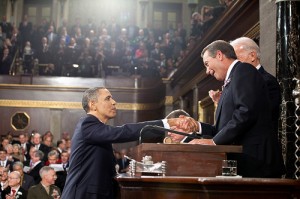We have much more to do and your continued support is needed now more than ever.
A Conservationist’s Preview to President Obama’s 2012 State of the Union

In 2011, Congress repeatedly targeted conservation programs that protect America’s clean water, clean air, healthy rivers, lakes and shorelines teeming with wildlife, benefits that every American has a right to enjoy. At the same time, Congress protected tax giveaways for coal, oil and gas special interests totaling billions of dollars.
Will we hear a different tune in 2012? Some key issues to consider in advance of President Obama’s State of the Union address:
- Keystone XL tar sands pipeline: Big Oil and its Congressional allies tried to ram this pipeline down the throats of American families in their insatiable appetite for more profits, forcing President Obama into a decision even before a final route was mapped out. Keystone XL is a scam – Canada would get the jobs, China would get the oil, and America would get spills of toxic tar sands oil. House Speaker John Boehner said on Sunday he may once again hold a critical payroll tax extension hostage in an attempt to force approval of the pipeline over concerns from Nebraska landowners and safety regulators.
- Clean Air Act limits on mercury and carbon pollution: The House took an incredible 191 anti-environment votes in 2011, but new limits on mercury pollution (rolled out last month) and carbon pollution (due this year) have survived the assaults. The new mercury standard will not only prevent 11,000 thousand premature deaths, it will support 46,000 new short-term construction jobs and 8,000 long-term utility jobs. The first-ever carbon standard is an important step towards holding polluters accountable for their emissions, creating a more level playing field to give a fair shot to America’s expanding clean economy, which already supports 2.7 million jobs.
- New fuel efficiency standards: American businesses, labor, conservation and consumer groups have all gotten behind the Obama administration’s stronger fuel efficiency standards that cut pollution, build jobs, save families and businesses money and enhance America’s security. With big benefits across the board, it’s no surprise that the most recent survey by consumer reports found that 93% of the public supports stricter fuel economy standards.
- Renewable energy tax credits: Despite the economic struggles, 2011 was a banner year for clean energy, with global investment surging to a record $260 billion according to Bloomberg New Energy Finance. Congress can ensure continued growth simply by extending existing renewable energy tax credits, which would create and sustain 54,000 jobs within the next four years according to Navigant Consulting and represent just a fraction of the subsidies Congress feeds to the coal, gas and oil industries.
- Clean Water Act restoration: Clean water protections have been weakened by two Supreme Court decisions that ignored congressional intent and narrowly interpreted the scope of waters covered by the Act, putting in doubt pollution safeguards for many vital wetlands, lakes and streams. Restoring the Clean Water Act would help protect the $122 billion outdoor recreation economy and over 1 million outdoor recreation jobs supported by hunters, anglers, and other Americans who enjoy the outdoors.
- Gulf Coast restoration (RESTORE Act): Under current law, BP and others responsible for the Gulf oil disaster must pay Clean Water Act penalties for each barrel of oil spilled into the gulf, but without action from Congress, this money will go towards unrelated federal spending instead of restoring the area damaged by the spill. Will the White House and Congress make this urgent legislation a priority?
In 2012, Washington has a chance to restore not just fiscal balance to our budget, but moral purpose to America’s future. Future generations will judge us on the legacy that we leave behind. We must not turn back the clock and say we can’t afford clean air and water for our children and grandchildren.
The National Wildlife Federation’s four million supporters from across the political spectrum want clean energy and they want leaders who’ll face down special interests to deliver it. President Obama has shown he’s willing to stand up to oil lobbyists to safeguard clean water, clean air and wildlife to create a better, stronger, healthier America. Is Congress willing to do the same?
 Take Action
Take Action
The Environmental Protection Agency is acting now to limit carbon pollution from coal-fired power plants, but is coming under assault from polluter-funded attack groups.
Let the Environmental Protection Agency know support limits on carbon pollution to protect the future of polar bears.






















